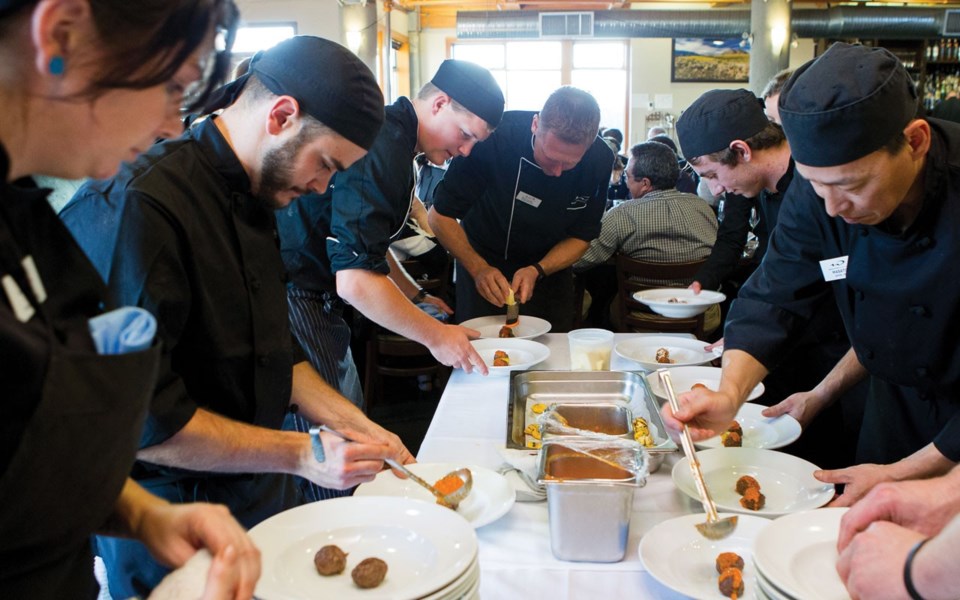A recent report paints a dire picture for the future of the B.C.'s restaurant industry, predicting the province will come up short on skilled labour by 514,000 workers over the next decade.
The B.C. Restaurant and Foodservices Association (BCRFA) report pinned the lack of qualified workers in the industry primarily to its reputation for long hours and low pay, as well as an outdated culture that persists in many kitchens. The report also suggested that chefs and cooks already employed in the industry aren't recommending the profession to their peers, which has only exacerbated the labour gap.
"I understand that there is more money and more permanence in almost every other trade other than professional cooking," said Red Seal chef Mike Quigley, who has worked in several Whistler restaurants and hotel kitchens over the years.
Quigley said it is becoming increasingly difficult to sustain a viable career in cheffing, in part because of the low value society generally places on food. He pointed to the tipping culture that is so entrenched in North America as another major culprit.
"There's no reason why a first cook in a nice restaurant should make $16 an hour, work 10 hours a day and get $50 every two weeks as his quote-unquote portion of the tip pool," he said. "A server comes in at the same very nice restaurant, works for four or five hours—yes, they work hard, yes, they deserve to get paid $20 an hour, but they do not deserve to take home $250 a night in tips. That is ludicrous."
Quigley also spoke to the longstanding ethos, particularly in fine dining, that "the better the restaurant you work in, the less you get paid.
"It's usually in a traditional set-up, with your typical angry chef cooking Old-World cuisine," he added. "You don't typically start making good money until you reach the chef de cuisine or sous chef level. Your first cook, your chef de partie, the guys that are actually physically doing a lot of the prep work and the cooking on the day to day, they don't get monetized."
While he agrees it still persists in the industry, that old-school approach isn't as common in the resort's restaurant sector, according to Eric Griffith, owner of Alta Bistro and the president of the Restaurant Association of Whistler (RAW).
"Any of us in our group at RAW would agree that that's definitely something that's been part of this industry for many years. But I think it's changing," he said. "Now, work-life balance is so important to everyone, so we're having to adapt. If you're working hard and working longer hours in Whistler, you're getting the ability to enjoy it as well. We still have these shoulder periods. These are times when the days are shorter, you have an extra day off a week, and it kind of refreshes everyone."
Whistler, of course, has had to contend with its own longstanding labour shortage. With such high turnover, there is almost always a new stream of entry-level workers available, but the constant churn of staff presents yet another barrier to career advancement, Quigley said.
"Having to constantly train people in a lesser position, you're not going to be able to spend any time bettering yourself or in any sort of personal mentorship role with the person who's got more skill than you have," he noted.
Whistler has other distinct challenges, Griffith said, pointing specifically to the exorbitant cost and red tape required to hire temporary foreign workers, which he stressed make up a significant portion of Whistler's restaurant industry.
"It costs the business up to $10,000 to get a foreign worker. When you consider legal and all these things, that's an enormous cost to a small business," he said.
"Something we've been working with the province, our MLA and our MP on is continuing the thought that resort municipalities like Whistler, like Tofino, should have some type of special right for temporary foreign workers."
Last summer, the Whistler Chamber of Commerce sent a letter to Ottawa decrying several proposed changes to the federal program. Chiefly, the chamber requested the government consider how businesses will recoup the "significant costs" of recruitment and training in the event a worker moves on; that workers recruited through the program be required to remain with their initial employer for a minimum of six months; and that an alternative model be developed that "could involve regional-based, community-focused or sector-specific temporary permit holder labour pools," an idea that has been floated in Whistler for years.
Given the lack of long-term job prospects in the industry, Quigley said it's inevitable that more trained chefs will be looking to go into business for themselves, moving into private cooking or launching their own food trucks, as Quigley has. His Hawaiian-themed drink trailer, The Island Oasis, is set to launch this spring.




